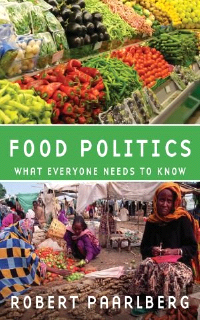America’s national conversation on food and food politics has been heating up lately.
Of note is The Center for Strategic and International Studies upcoming conference on April 27th on Cultivating Global Food Security: A Strategy for U.S. Leadership on Productivity, Agricultural Research and Trade. It features Senators Richard Lugar, Robert Casey and Rep. Betty McCollum and a panel of experts.
 But if the idea of food politics is still dauntingly complicated, take a step backward and pick up Robert Paarlberg‘s Food Politics: What Everyone Needs To Know (Oxford 2010). He outlines all the issues from the often-conflicting aims of governments, consumers and farmers to the issues of hunger, obesity and food aid.
But if the idea of food politics is still dauntingly complicated, take a step backward and pick up Robert Paarlberg‘s Food Politics: What Everyone Needs To Know (Oxford 2010). He outlines all the issues from the often-conflicting aims of governments, consumers and farmers to the issues of hunger, obesity and food aid.
Food Politics is part encyclopedia and part textbook – but without the complexity and jargon one finds in either kind of book. It is a comprehensive and easy-to-read book. It heads its subsections headed with bold questions, as if aimed at a class of unruly students:
- Do rich countries give food aid to dispose of their surplus production? (p. 72)
- Is the food industry to blame for what we eat? (p. 88)
- Why aren’t their stronger authorities to govern food and farming around the world? (p. 174).
Paalberg gives straightforward answers, backing up his opinions with research and tying the issues to one another.
This is a sensible and — for Foodies — an essential book.
